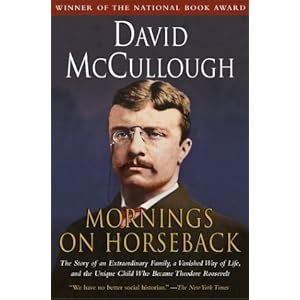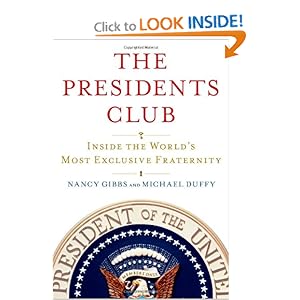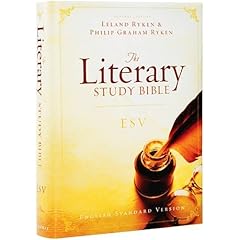Mornings on Horseback by David McCullough.
River of Doubt: Theodore Roosevelt’s Darkest Journey by Candice Millard.
Theodore Rex by Edmund Morris.
 Theodore Roosevelt is one of my fascinations. I read McCullough’s Mornings on Horseback back in March, but I never got around to reviewing it. It was a lovely narrative biography of the young Teddy Roosevelt and a good attempt to bring to light some of the influences and experiences in his childhood and youth that made Teddy Roosevelt the man he became. However, the book stops rather abruptly just as young Theodore is on the brink of his national political career. I was primed and eager for more “Teedy” after reading Mornings.
Theodore Roosevelt is one of my fascinations. I read McCullough’s Mornings on Horseback back in March, but I never got around to reviewing it. It was a lovely narrative biography of the young Teddy Roosevelt and a good attempt to bring to light some of the influences and experiences in his childhood and youth that made Teddy Roosevelt the man he became. However, the book stops rather abruptly just as young Theodore is on the brink of his national political career. I was primed and eager for more “Teedy” after reading Mornings.
A few Teddy-isms:
“For unflagging interest and enjoyment, a household of children, if things go reasonably well, certainly makes all other forms of success and achievement lose their importance by comparison.”
“There are two things that I want you to make up your minds to: first, that you are going to have a good time as long as you live – I have no use for the sour-faced man – and next, that you are going to do something worthwhile, that you are going to work hard and do the things you set out to do.”
“Don’t hit at all if you can help it; don’t hit a man if you can possibly avoid it; but if you do hit him, put him to sleep.”
“A thorough knowledge of the Bible is worth more than a college education.”
“In any moment of decision the best thing you can do is the right thing, the next best thing is the wrong thing, and the worst thing you can do is nothing.”
“I can be President of the United States, or I can control Alice. I cannot possibly do both.” Teddy’s response to a request to better control the behavior of his eldest daughter, Alice Roosevelt.
“Far better is it to dare mighty things, to win glorious triumphs, even though checkered by failure… than to rank with those poor spirits who neither enjoy nor suffer much, because they live in a gray twilight that knows not victory nor defeat.”
“I don’t think any President ever enjoyed himself more than I did. Moreover, I don’t think any ex-President ever enjoyed himself more.”
“If I’m to go, it’s all right. You see that the others don’t stop for me . . . I’ve the shortest span of life ahead of any in the party. If anyone is to die here, I must be the one.”
 That last statement was made to a member of Roosevelt’s expedition through the Amazon when Roosevelt was so seriously ill with fever and infection that he was not expected to survive to complete the journey of exploration. On this expedition Theodore Roosevelt was 55 years old, and until his leg became infected he could keep up with or outlast any man in the group.
That last statement was made to a member of Roosevelt’s expedition through the Amazon when Roosevelt was so seriously ill with fever and infection that he was not expected to survive to complete the journey of exploration. On this expedition Theodore Roosevelt was 55 years old, and until his leg became infected he could keep up with or outlast any man in the group.
Theodore Roosevelt became president at forty-two, when William McKinley was assassinated. Although he wasn’t the youngest man ever elected president (that was Kennedy, age 43), Teddy was the youngest to become president. When TR’s second term was over, he was still only fifty years old, making him the youngest ex-president, too.
T.R., b. 1858, is my favorite of all the presidents. I don’t say he was the best or the wisest or the one I would most agree with politically, but he would definitely be the most interesting dinner guest of all the presidents. He was a talented politician and statesman, but he was also real and straightforward and ingenuous. That’s an amazing combination.
What people said about Teddy Roosevelt:
“Look out for Theodore. He’s not strong, but he’s all grit. He’ll kill himself before he’ll even say he’s tired.” ~A doctor who knew young Teddy Roosevelt.
“Now look–that d— cowboy is President of the United States!” ~Senator Mark Hanna after hearing of McKinley’s assassination.”
“You must always remember that the President (TR) is about six.” ~Cecil Spring RIce
“One subject I do know, and ought to know, is the birds. It has been one of the main studies of a long life He (TR) knew the subject as well as I did, while he knew with the same thoroughness scores of other subjects of which I am entirely ignorant.” ~Naturalist John Burroughs.
“Mr. Roosevelt is the Tom Sawyer of the political world of the twentieth century; always showing off; always hunting for a chance to show off; in his frenzied imagination the Great Republic is a vast Barnum circus with him for a clown and the whole world for audience; he would go to Halifax for half a chance to show off and he would go to hell for a whole one.” ~Mark Twain
“And talk! I never saw a man who talked so much. He would talk all the time he was in swimming, all of the time during meals, traveling in the canoe and at night around the camp fire. He talked endlessly and on all conceivable subjects.” ~Brazilian Colonel Candido Rondon who led with TR an expedition down the previously unexplored River of Doubt in Brazil’s Amazon rainforest.
“The truth is, he believes in war and wishes to be a Napoleon and to die on the battle field. He has the spirit of the old berserkers.” ~William Howard Taft.
Teddy Roosevelt “read so rapidly that he had to plan very carefully in order to have enough books to last him through a trip.” ~Roosevelt’s son, Kermit.
“Death had to take him in his sleep, for if he was awake there’d have been a fight.” ~Thomas R. Marshall, Vice-president of the U.S.
“Never before has it been so hard for me to accept the death of any man as it has been for me to accept the death of Theodore Roosevelt. A pall seems to settle upon the very sky. The world is bleaker and colder for his absence from it. We shall not look upon his like again.” ~John Burroughs
 I saw River of Doubt at a bookstore in South Dakota, and I had to buy it. After viewing Teddy’s unmistakeable visage on Mount Rushmore and then seeing the Badlands Teddy’s old stomping grounds, I had to read about this Amazonian journey of exploration undertaken after Roosevelt’s disappointing loss in a bid for a third term as president. Teddy Roosevelt was intrepid and courageous to a fault, and he lived for adventure. At the age of 55 a trip down an unexplored South American river in canoes passing through the territory of savage and violent native tribal peoples who had never seen a white man before should have been out of the question. And the fact that the trip almost ended Roosevelt’s life makes it all the more fascinating.
I saw River of Doubt at a bookstore in South Dakota, and I had to buy it. After viewing Teddy’s unmistakeable visage on Mount Rushmore and then seeing the Badlands Teddy’s old stomping grounds, I had to read about this Amazonian journey of exploration undertaken after Roosevelt’s disappointing loss in a bid for a third term as president. Teddy Roosevelt was intrepid and courageous to a fault, and he lived for adventure. At the age of 55 a trip down an unexplored South American river in canoes passing through the territory of savage and violent native tribal peoples who had never seen a white man before should have been out of the question. And the fact that the trip almost ended Roosevelt’s life makes it all the more fascinating.
I’m still reading the my third book about Theodore Roosevelt, a biography that begins with TR’s sudden elevation to the presidency. I’m finding it just as interesting and inspiring as the other two were. I’m not tempted to undertake any physical feats of daring and bravery, but I do want to live as passionately as Teddy Roosevelt. Don’t you know that heaven itself is a more lively and passion-filled place because God created Theodore Roosevelt and took him to explore the universe of God’s creation?
 Destiny of the Republic: A Tale of Madness, Medicine and the Murder of a President by Candice Millard.
Destiny of the Republic: A Tale of Madness, Medicine and the Murder of a President by Candice Millard.












